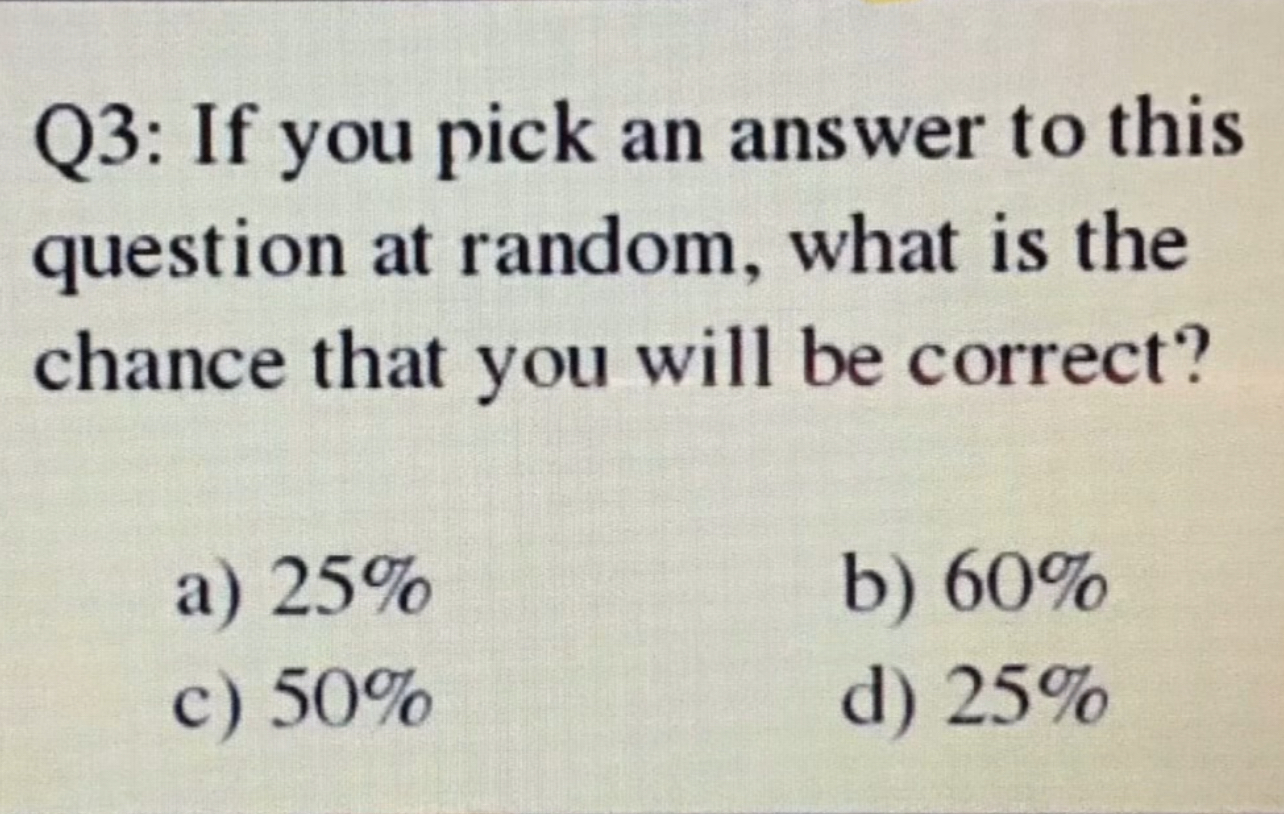There is absolutely no way it is 60%. Because you can never have 60% chances of picking anything particular when there are only 4 choices. Knowing this, the answer is either 25% or 50%. Two effective choices, so the answer is C, 50%.
Science Memes
Welcome to c/science_memes @ Mander.xyz!
A place for majestic STEMLORD peacocking, as well as memes about the realities of working in a lab.

Rules
- Don't throw mud. Behave like an intellectual and remember the human.
- Keep it rooted (on topic).
- No spam.
- Infographics welcome, get schooled.
This is a science community. We use the Dawkins definition of meme.
Research Committee
Other Mander Communities
Science and Research
Biology and Life Sciences
- !abiogenesis@mander.xyz
- !animal-behavior@mander.xyz
- !anthropology@mander.xyz
- !arachnology@mander.xyz
- !balconygardening@slrpnk.net
- !biodiversity@mander.xyz
- !biology@mander.xyz
- !biophysics@mander.xyz
- !botany@mander.xyz
- !ecology@mander.xyz
- !entomology@mander.xyz
- !fermentation@mander.xyz
- !herpetology@mander.xyz
- !houseplants@mander.xyz
- !medicine@mander.xyz
- !microscopy@mander.xyz
- !mycology@mander.xyz
- !nudibranchs@mander.xyz
- !nutrition@mander.xyz
- !palaeoecology@mander.xyz
- !palaeontology@mander.xyz
- !photosynthesis@mander.xyz
- !plantid@mander.xyz
- !plants@mander.xyz
- !reptiles and amphibians@mander.xyz
Physical Sciences
- !astronomy@mander.xyz
- !chemistry@mander.xyz
- !earthscience@mander.xyz
- !geography@mander.xyz
- !geospatial@mander.xyz
- !nuclear@mander.xyz
- !physics@mander.xyz
- !quantum-computing@mander.xyz
- !spectroscopy@mander.xyz
Humanities and Social Sciences
Practical and Applied Sciences
- !exercise-and sports-science@mander.xyz
- !gardening@mander.xyz
- !self sufficiency@mander.xyz
- !soilscience@slrpnk.net
- !terrariums@mander.xyz
- !timelapse@mander.xyz
Memes
Miscellaneous
If C is the correct choice, then that is only one answer out of four that is correct, meaning you only had a 25% chance to answer correctly. You've created a logical paradox.
25% occurs twice, so in reality there are only 3 outcomes from your pick. Since you know 25% is incorrect from this, that is 30% of the total answers, but also 50% of total options. Via this, you can conclude that both b and c are valid answers, depending on whether you view it in relation to outcomes or in relation to options. If you view the 3 outcomes, then you have a 60% chance of being right, but if you view the 4 options, you have a 50% chance of being right. Both 50% and 60% being accepted as anwswers solves the paradoxical nature of the question.
the key word here is at random, you imagine a situation where you're doing it at random, but you're not actually answering randomly are you?
C, which means A or D, which means C, which means...
Lisa stays home?
I asked Google to roll a D4 and it rolled a 4. So my answer (correct or not) when following the directions in the question is the fourth one (D).
The question is malformed and the correct answer isn't listed in the multiple choices. Therefore the correct answer is 0%
Paradoxes aside, if you're given multiple choices without the guarantee that any of them are correct, you can't assign a chance of picking the right one at random anyway.
I see 25% twice so my bet is on 50%.
But 50% only appears once, which would make the answer 25%.
It's probably graded by a computer, and a) or d) is a fake answer, since the automated system doesn't support multiple right answers.
I'm going to go with 25% chance if picking random, and a 50% chance if picking between a) and d).
If it's graded by a human, the correct answer is f) + u)
Many systems do allow multiple correct answers.
42
But what's the question?
What is six times nine
Close, but nah, it's the meaning of life
nuh uh, it's the answer. to life, the universe, everything! Um, but what's the question?
how many roads must a man walk down?
This is a conundrum wrapped in a turducken, swaddled in nesting dolls.
lol chill out there buddy it is only self-referential once. maybe twice.
33% innit
It is 33% if the answer itself is randomly chosen from 25%, 50%, and 60%. Then you have:
If the answer is 25%: A 1/2 chance of guessing right
If the answer is 50%: A 1/4 chance of guessing right
If the answer is 60%: A 1/4 chance of guessing right
And 1/3*1/2 + 1/3*1/4 + 1/3*1/4 = 1/3, or 33.333...% chance
If the answer is randomly chosen from A, B, C, and D (With A or D being picked meaning D or A are also good, so 25% has a 50% chance of being the answer) then your probability of being right changes to 37.5%.
This would hold up if the question were less purposely obtuse, like asking "What would be the probability of answering the following question correctly if guessing from A, B, C and D randomly, if its answer were also chosen from A, B, C and D at random?", with the choices being something like "A: A or D, B: B, C: C, D: A or D"
What's the correct value if the answer is not picked at random but the test takers can choose freely?
All answers are correct then.
